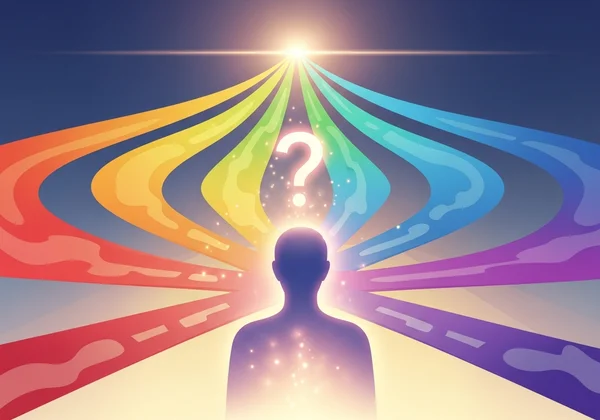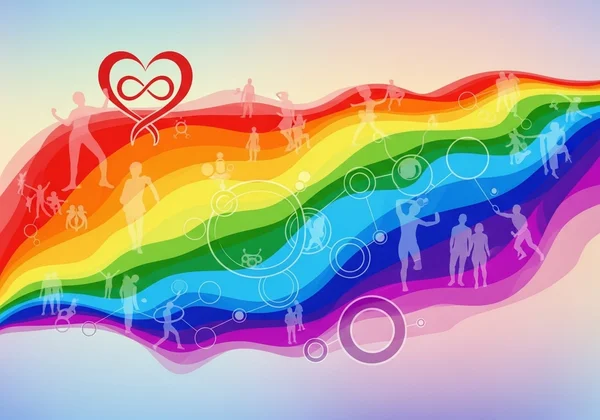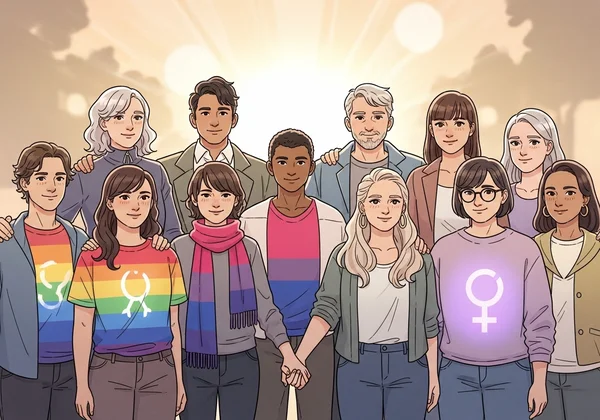ค้นพบรสนิยมทางเพศของคุณ: คู่มือและแบบทดสอบฉบับสมบูรณ์
September 2, 2025 | By Riley Foster
รู้สึกท่วมท้นเมื่อคุณเริ่มต้นการเดินทางของการค้นพบตัวเองใช่ไหม? นั่นเป็นเรื่องปกติโดยสิ้นเชิง โดยเฉพาะอย่างยิ่งเมื่อต้องทำความเข้าใจรสนิยมทางเพศ ด้วยคำศัพท์และความคิดมากมาย คุณอาจสงสัยว่าจะเริ่มต้นที่ไหนดี คู่มือนี้จะช่วยให้คุณเข้าใจสเปกตรัมอันงดงามและความหลากหลายของเรื่องเพศมนุษย์ โดยนำเสนอ คำนิยามรสนิยมทางเพศ ที่ชัดเจน และพื้นที่ที่สนับสนุนสำหรับการสำรวจ หากคุณเคยถามตัวเองว่า เป็นเรื่องปกติหรือไม่ที่จะตั้งคำถามเกี่ยวกับเรื่องเพศของฉัน? คำตอบคืออย่างแน่นอน มันเป็นก้าวที่กล้าหาญและดีต่อสุขภาพในการทำความเข้าใจว่าคุณเป็นใคร เพื่อช่วยคุณในเส้นทางนี้ แพลตฟอร์มของเรามี แบบทดสอบเกย์ฟรี ที่ออกแบบมาสำหรับการใคร่ครวญส่วนตัว แบบทดสอบเกย์ ที่เป็นความลับนี้เป็นวิธีที่ปลอดภัยในการเริ่มต้นการเดินทางของคุณ

สำรวจภูมิทัศน์ของรสนิยมทางเพศ
ก่อนที่จะเจาะลึกถึงคำจำกัดความเฉพาะเจาะจง การทำความเข้าใจแนวคิดที่กว้างขึ้นเป็นสิ่งที่เป็นประโยชน์ รสนิยมทางเพศไม่ใช่สวิตช์ง่ายๆ ที่มีเพียงไม่กี่ตัวเลือก แต่มันเป็นภูมิทัศน์ที่กว้างใหญ่และเป็นส่วนตัว มันอธิบายถึงรูปแบบความดึงดูดทางอารมณ์ ความรู้สึกรักใคร่ หรือทางเพศที่คงอยู่ยาวนานของบุคคลต่อผู้อื่น การคิดว่ามันเป็นสเปกตรัมช่วยให้รู้สึกอิสระได้ เนื่องจากมันช่วยให้เกิดประสบการณ์ที่ไม่เหมือนใครทั้งหมดที่มีอยู่ระหว่างและนอกเหนือจากหมวดหมู่แบบดั้งเดิม

ทำความเข้าใจความดึงดูดทางเพศกับความดึงดูดทางโรแมนติก
จุดที่มักสับสนคือความแตกต่างระหว่างความดึงดูดทางเพศกับความดึงดูดทางโรแมนติก ความดึงดูดทางเพศ คือการที่คุณต้องการมีปฏิสัมพันธ์ทางกายภาพและทางเพศกับใคร ในทางกลับกัน ความดึงดูดทางโรแมนติก คือการที่คุณต้องการมีความผูกพันทางอารมณ์อย่างลึกซึ้งกับใคร เช่น การออกเดทหรือการตกหลุมรัก สำหรับบางคน ทั้งสองสิ่งนี้สอดคล้องกันอย่างสมบูรณ์ แต่สำหรับคนอื่น ๆ ก็ไม่เป็นเช่นนั้น คุณสามารถมีความดึงดูดทางโรแมนติกกับคนกลุ่มหนึ่ง และมีความดึงดูดทางเพศกับคนอีกกลุ่มหนึ่งได้ การตระหนักถึงความแตกต่างนี้เป็นส่วนสำคัญในการค้นพบตัวเองของคุณ
ความลื่นไหลของอัตลักษณ์ทางเพศ: มันเปลี่ยนแปลงได้หรือไม่?
สิ่งสำคัญที่สุดอย่างหนึ่งที่ควรจำคืออัตลักษณ์ทางเพศสามารถมีความลื่นไหลได้ สำหรับบางคน รสนิยมยังคงสอดคล้องกันตลอดชีวิตของพวกเขา สำหรับคนอื่น ๆ มันอาจเปลี่ยนแปลงและพัฒนาไปตามช่วงเวลาเมื่อพวกเขามีประสบการณ์ใหม่ ๆ และทำความเข้าใจตนเองได้ลึกซึ้งยิ่งขึ้น นี่ไม่ได้ทำให้ความรู้สึกของคุณมีค่าน้อยลง ไม่มีความกดดันที่จะต้องหาคำนิยามเดียวและยึดมั่นกับมันตลอดไป การเดินทางของคุณเป็นของคุณคนเดียว และไม่เป็นไรหากมันจะมีการพลิกผัน
เหตุใดเราจึงใช้คำนิยามสำหรับรสนิยมทางเพศ?
แล้วทำไมเราถึงมีคำนิยามเลย? สำหรับหลายคน คำนิยามเป็นเครื่องมือที่มีประสิทธิภาพ พวกเขาสามารถให้การเป็นส่วนหนึ่งของชุมชน ช่วยให้คุณพบคนอื่น ๆ ที่มีประสบการณ์คล้ายคลึงกัน คำนิยามยังสามารถให้ภาษาเพื่ออธิบายความรู้สึกของคุณกับตัวเองและผู้อื่น ซึ่งสามารถเป็นการยืนยันความถูกต้องได้อย่างไม่น่าเชื่อ อย่างไรก็ตาม หากไม่มีคำนิยามใดที่รู้สึกว่าเหมาะสม นั่นก็ไม่เป็นไรเช่นกัน เป้าหมายคือการเข้าใจตัวเอง ไม่ใช่การจำกัดตัวเองอยู่ในกรอบ คุณคือผู้มีสิทธิ์ขาดในอัตลักษณ์ของคุณเอง
การทำความเข้าใจรสนิยมทางเพศ LGBTQ+: นิยามและคำศัพท์สำคัญ
นี่คือรายการคำศัพท์ทั่วไปบางส่วนที่ใช้เพื่ออธิบายรสนิยมทางเพศที่แตกต่างกัน นี่ไม่ใช่รายการที่ครบถ้วนสมบูรณ์ แต่เป็นจุดเริ่มต้นที่ดีสำหรับการสร้างคลังคำศัพท์ของคุณและทำความเข้าใจวิธีที่หลากหลายที่ผู้คนประสบกับความดึงดูด

การเป็นเกย์หรือเลสเบี้ยนหมายความว่าอย่างไร?
คำว่า เกย์ มักใช้เพื่ออธิบายผู้ชายที่มีความดึงดูดทางอารมณ์ โรแมนติก และ/หรือทางเพศต่อผู้ชายคนอื่น ๆ คำว่า เลสเบี้ยน หมายถึงผู้หญิงที่มีความดึงดูดต่อผู้หญิงคนอื่น ๆ คำทั้งสองนี้อธิบายถึงความดึงดูดเพศเดียวกัน และเป็นอัตลักษณ์ที่เป็นรากฐานภายในชุมชน LGBTQ+ บางครั้ง "เกย์" ถูกใช้เป็นคำที่ครอบคลุมสำหรับทุกคนที่ไม่ใช่รักต่างเพศ แต่โดยส่วนใหญ่แล้วจะใช้สำหรับผู้ชาย
ไบเซ็กชวล: ความดึงดูดต่อเพศที่หลากหลาย
บุคคล ไบเซ็กชวล คือผู้ที่มีความดึงดูดต่อมากกว่าหนึ่งเพศ นี่เป็นจุดที่มักสับสน เนื่องจากมีตำนานมากมายเกี่ยวกับไบเซ็กชวลลิสต์ มันไม่ได้หมายความว่าคุณดึงดูดผู้ชายและผู้หญิงในสัดส่วนที่เท่ากัน และไม่ได้หมายความว่าคุณ "สับสน" ไบเซ็กชวลลิสต์เป็นรสนิยมที่ถูกต้องและมั่นคง ซึ่งครอบคลุมความดึงดูดที่หลากหลาย หากคุณกำลังสำรวจสิ่งนี้ แบบทดสอบไบเซ็กชวล สามารถเป็นเครื่องมือที่มีประโยชน์สำหรับการใคร่ครวญ
แพนเซ็กชวล: ความดึงดูดโดยไม่จำกัดเพศสภาพ
บุคคล แพนเซ็กชวล คือผู้ที่ความดึงดูดต่อผู้อื่นไม่ถูกจำกัดด้วยเพศสภาพหรืออัตลักษณ์ทางเพศของพวกเขา คำนำหน้า "pan-" หมายถึง "ทั้งหมด" ซึ่งบ่งชี้ว่าบุคคลแพนเซ็กชวลสามารถดึงดูดทั้งผู้ชาย ผู้หญิง คนข้ามเพศ และบุคคลที่ไม่ใช่ไบนารี ความแตกต่างที่สำคัญจากไบเซ็กชวลลิสต์คือ สำหรับแพนเซ็กชวลแล้ว เพศมักจะไม่ใช่ปัจจัยในการดึงดูดเลย พวกเขาดึงดูดบุคคลนั้น ๆ โดยไม่คำนึงว่าเพศของพวกเขาคืออะไร
เอเซ็กชวล: ทำความเข้าใจการไม่มีความดึงดูดทางเพศ
บุคคล เอเซ็กชวล หรือที่มักเรียกว่า "เอซ" คือผู้ที่ไม่ได้ประสบกับการดึงดูดทางเพศต่อผู้อื่น นี่เป็นสเปกตรัมที่กว้าง บางคนที่เป็นเอเซ็กชวลอาจมีความดึงดูดทางโรแมนติกและต้องการความสัมพันธ์ทางอารมณ์ ในขณะที่บางคนก็ไม่เป็นเช่นนั้น สิ่งสำคัญคือต้องเข้าใจว่าเอเซ็กชวลลิสต์เป็นรสนิยม ไม่ใช่ทางเลือกเหมือนการถือพรหมจรรย์ หรือภาวะทางการแพทย์ มันเป็นความหลากหลายตามธรรมชาติในเรื่องเพศของมนุษย์
เควียร์และผู้ตั้งคำถาม: การยอมรับอัตลักษณ์ที่ครอบคลุม
เควียร์ เป็นคำที่ครอบคลุมที่ได้รับการนำกลับมาใช้โดยหลายคนในชุมชน LGBTQ+ มันครอบคลุมทุกคนที่ไม่ระบุว่าเป็นรักต่างเพศหรือผู้ที่มีเพศสภาพตรงกับเพศกำเนิด เป็นอัตลักษณ์ที่ครอบคลุมและมักเป็นการเมืองที่เฉลิมฉลองความไม่ชัดเจน การตั้งคำถาม คือกระบวนการที่กระตือรือร้นในการสำรวจรสนิยมทางเพศหรืออัตลักษณ์ทางเพศของตัวเอง การอยู่ในช่วงของการตั้งคำถามเป็นส่วนที่ถูกต้องและสำคัญของการเดินทางของหลายคน
การเดินทางส่วนตัวของคุณเกี่ยวกับอัตลักษณ์ทางเพศ
การทำความเข้าใจคำนิยามเหล่านี้เป็นสิ่งหนึ่ง แต่การนำไปใช้กับชีวิตของคุณเองเป็นอีกสิ่งหนึ่ง การเดินทางของคุณไม่เหมือนใคร และสิ่งสำคัญคือต้องอดทนและใจดีกับตัวเองตลอดกระบวนการนี้ มันไม่ใช่การแข่งขันเพื่อหาคำตอบ แต่เป็นเส้นทางของการใคร่ครวญตนเอง สำหรับผู้ที่ต้องการความชัดเจนยิ่งขึ้น ข้อมูลเชิงลึกจาก AI ที่เป็นเอกลักษณ์ของเราสามารถนำเสนอรายงานส่วนบุคคลเพื่อช่วยแนะนำความคิดของคุณได้
การหักล้างความเชื่อผิดๆ เกี่ยวกับรสนิยมทางเพศ
ขณะที่คุณสำรวจ คุณอาจพบกับตำนานและความเข้าใจผิด บางคนอาจกล่าวว่าการเป็น LGBTQ+ เป็น "เพียงแค่ช่วงหนึ่ง" หรือว่าคนไบเซ็กชวลจำเป็นต้อง "เลือกข้าง" คำกล่าวเหล่านี้เป็นอันตรายและไม่เป็นความจริง ความรู้สึกของคุณเป็นจริงและถูกต้อง ไม่ว่าคนอื่นจะพูดอะไร รสนิยมทางเพศของบุคคลเป็นส่วนหนึ่งที่แท้จริงของตัวตนของพวกเขา ไม่ใช่ทางเลือกหรือสถานะชั่วคราว จงเชื่อมั่นในความรู้สึกของตัวเองเหนือเสียงรบกวนภายนอก
การค้นหาการสนับสนุนและชุมชนสำหรับอัตลักษณ์ของคุณ
คุณไม่จำเป็นต้องเดินทางคนเดียว การค้นหาชุมชนที่สนับสนุนสามารถสร้างความแตกต่างได้อย่างมาก ซึ่งอาจหมายถึงการพูดคุยกับเพื่อนที่ไว้ใจได้ การค้นหาฟอรัมออนไลน์ หรือการเชื่อมต่อกับศูนย์ LGBTQ+ ในพื้นที่ การรู้สึกว่ามีคนเห็นและเข้าใจสามารถเสริมพลังได้อย่างไม่น่าเชื่อ แพลตฟอร์มของเราสร้างขึ้นโดยสมาชิกและพันธมิตรของชุมชน LGBTQ+ เพื่อเป็นก้าวแรกที่ปลอดภัย การทำ แบบทดสอบรสนิยมทางเพศ LGBTQ+ ของเราเป็นวิธีส่วนตัวในการเริ่มต้นเชื่อมโยงกับแนวคิดเหล่านี้

ส่งเสริมการเดินทางแห่งการค้นพบตนเองของคุณ
จำไว้ว่า การสำรวจเรื่องเพศของคุณเป็นการแสดงออกถึงความรักตนเองอย่างลึกซึ้ง มันคือการยอมรับความรู้สึกที่แท้จริงของคุณ และให้เสรีภาพแก่ตัวเองในการเป็นความเป็นตัวของตัวเอง ไม่ว่าคุณจะพบคำนิยามที่เหมาะสมอย่างสมบูรณ์แบบ หรือชอบที่จะยอมรับความลื่นไหล การเดินทางของคุณนั้นถูกต้องและสวยงาม ไม่มีวิธีที่ถูกหรือผิดในการรู้สึก
คู่มือนี้เป็นเพียงจุดเริ่มต้น ความเข้าใจที่แท้จริงมาจากภายใน หากคุณพร้อมที่จะก้าวต่อไปในสภาพแวดล้อมที่ปลอดภัย เป็นส่วนตัว และให้การสนับสนุน เราขอแนะนำให้คุณ สำรวจความรู้สึกของคุณ บนหน้าแรกของเรา แบบทดสอบของเราได้รับการออกแบบโดยผู้เชี่ยวชาญและสมาชิกในชุมชน เพื่อช่วยให้คุณไตร่ตรองถึงความดึงดูดและอารมณ์ของคุณ ซึ่งเป็นรากฐานสำหรับการสำรวจอย่างต่อเนื่องของคุณ
คำถามที่พบบ่อยเกี่ยวกับรสนิยมทางเพศ
ฉันจะรู้ได้อย่างไรว่าฉันเป็นเกย์หรือไบเซ็กชวล?
ไม่มีสัญญาณเดียวที่จะกำหนดรสนิยมของคุณได้ มันคือการไตร่ตรองถึงความรู้สึก ความดึงดูด และประสบการณ์ของคุณเมื่อเวลาผ่านไป ถามตัวเองว่าคุณดึงดูดใครในเชิงโรแมนติกและทางเพศ การเขียนบันทึกช่วยได้ เครื่องมืออย่าง แบบทดสอบว่าฉันเป็นเกย์หรือไม่ ถูกออกแบบมาเพื่อนำทางในการไตร่ตรองตนเองนี้ โดยการถามคำถามที่ช่วยให้คุณจัดระเบียบความคิดของคุณในรูปแบบที่มีโครงสร้างและปราศจากการตัดสิน
รสนิยมทางเพศของฉันสามารถเปลี่ยนแปลงได้หรือไม่เมื่อเวลาผ่านไป?
ใช่, แน่นอน สำหรับหลายคน เรื่องเพศมีความลื่นไหลและสามารถเปลี่ยนแปลงได้เมื่อพวกเขาเรียนรู้เพิ่มเติมเกี่ยวกับตัวเองและโลก อัตลักษณ์ของคุณถูกต้องในทุกช่วงชีวิตของคุณ สิ่งที่คุณรู้สึกในวันนี้เป็นของจริง และหากความรู้สึกนั้นพัฒนาไปในวันพรุ่งนี้ นั่นก็เป็นของจริงเช่นกัน การเดินทางคือการเป็นตัวของตัวเองในปัจจุบัน
เป็นเรื่องปกติหรือไม่ที่จะตั้งคำถามเกี่ยวกับเรื่องเพศของฉัน?
เป็นเรื่องปกติและดีต่อสุขภาพโดยสิ้นเชิงที่จะตั้งคำถามเกี่ยวกับเรื่องเพศของคุณ การตั้งคำถามเป็นสัญญาณของการพิจารณาตนเองและการตระหนักรู้ในตนเอง มันหมายความว่าคุณกำลังทำความเข้าใจตนเองอย่างลึกซึ้ง ซึ่งเป็นสิ่งที่กล้าหาญและสำคัญที่ต้องทำ หลายคนทุกวัยต่างก็ผ่านช่วงเวลาของการตั้งคำถาม
ฉันจะหาการสนับสนุนเพิ่มเติมสำหรับอัตลักษณ์ของฉันได้ที่ไหน?
มีแหล่งข้อมูลที่ยอดเยี่ยมมากมาย องค์กรต่างๆ เช่น The Trevor Project และ Human Rights Campaign (HRC) ให้การสนับสนุนและข้อมูล คุณยังสามารถมองหาศูนย์ชุมชน LGBTQ+ ในพื้นที่ได้ เว็บไซต์ของเราได้รับการออกแบบมาให้เป็นจุดเริ่มต้นที่ปลอดภัยและให้การสนับสนุน โดยนำเสนอเครื่องมือและข้อมูลที่จะช่วยให้คุณรู้สึกโดดเดี่ยวน้อยลงเมื่อคุณ เริ่มต้นเส้นทางของคุณ